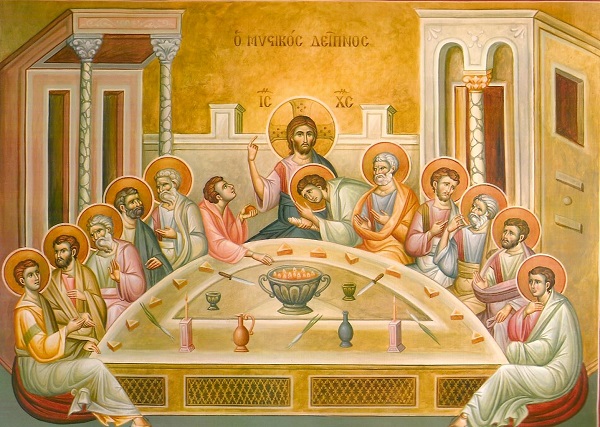Great Wednesday (Matins for Great Thursday)
12 April 2023‘Humbled by Your loving-kindness, You washed the feet of Your disciples, directing them to the path divine’. This sentence encapsulates one of the most prominent scenes of humility in the life of Christ, an extraordinarily strange image for a teacher, a leader, someone with authority over heaven and earth. Christ kneels and washes the feet of His disciples and, moreover, rejects any discussion of the propriety of the act. If Peter doesn’t agree to having his feet washed, he will have no relationship with the Lord, will be cut off, because, by refusing the gift and the humility, he would be allowing himself to be ruled by his own egotism.

It’s unusual for leaders in any era to behave with simplicity. Accompanied by their body-guards, by the powerful, by their supporters, phrases such as ‘I came not to be served but to serve’ or ‘Let the greatest among you be as the youngest and the leader as the one who serves’ ring hollowly in their ears. Having learned to govern, it’s difficult for them to relinquish power and they cling on to it relentlessly, unable to understand that the prime duty of a leader is to love, to give and to serve.
This is the ethos and proposal of the Church to the world. You serve when you forgive. You serve when you lose yourself in listening to the troubles of others, when you don’t use your official position, your talent and your role in order to promote yourself, but to give to others. Your serve when your concern isn’t to deceive others but to bring them the truth of the way things stand and also your efforts to change things for the better. You serve when you transform your ego, your victory, your triumph into a triumph for the many, by relinquishing your personal self-reliance, your personal happiness and your personal glory.
If this ethos were to find a response throughout society- at work, in politics, in the family and, where needed, in the Church- then we’d have a mystical transformation of people and society into the body of Christ, where the members would suffer for each other; where we would demand not for ourselves, but each for the others; where love and humility would create the sense that the aim of everything in life is the smile of your neighbour, even if this involves fewer profits, less productivity, less development. Because what good’s development to you when it costs in terms of love, purity of heart, happiness, simplicity, and time in your life on earth?
Christ’s humility in washing His disciples’ feet is the product of His loving-kindness, of a heart that loves people unreservedly. It leads to the path divine, that of giving, not of remuneration. It’s a rare ethos, one you don’t often come across, because happiness today is measured by the degree to which the human ego is satisfied. The whole course of the life of the Nazarene was, purely and simply, humility. Those who follow Him, follow this path.
If religion today is failing to bring the majority of people to genuine faith, that is due to the fact that no-one has come to wash people’s feet, to offer themselves whole-heartedly, without commanding, to serve without exercising authority. Perhaps because humility doesn’t make a fuss, wherever it exists. And it certainly does exist. In any case it’s thanks to this hidden service, that that small message continues to live and will strive to transform the world. With the cloth of tears and prayer, it will wipe the tired feet of those making their way through the anxieties of life. It will allow the smile of love and hope to seep into tired hearts. Just as His did.






